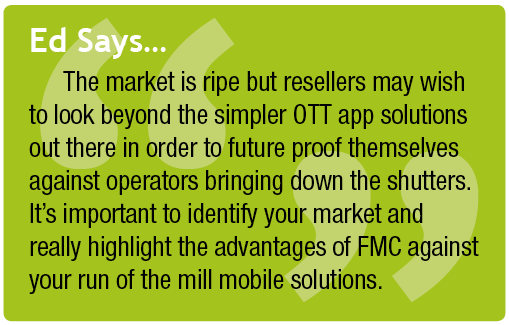
Despite the recent developments with 4G there is still a lack of high quality FMC propositions in the market for resellers to get their teeth into. In the last twelve months we have seen reseller interests in FMC starting to gather pace, but are we just scratching the surface? David Dungay investigates.
The bring your own device (BYOD) revolution has been well documented in Comms Business and it is precisely this trend that has led to the mobile as the preferred “weapon” of choice in, and out, of the office. With this trend comes an air of expectation among users want a seamless experience with FMC solutions when transferring between connections, after all if it works at home why shouldn’t it work at the office. When we first heard the term FMC a few years ago the overwhelming hope was that it would be an easy deployment through an app which would make it an easy sell for resellers. However, as mobile operators look to protect their voice revenues the future of OTT apps for FMC is uncertain.
Protecting revenues
Gavin Sweet, Director at Skyrack Telecom, commented on the predicament the operators are finding themselves in, “The mobile data networks are growing fast but operators will not risk continual erosion of voice revenues. Blocking and shaping of VOIP services is already happening and we can expect to see operators look to further cap or tariff VoIP services on the data networks. In the last 12 months we’ve seen Vodafone, T-Mobile and Orange all criticised for such practices. The regulators are unlikely to do much to influence this commercially - even though they may have net neutrality ambitions, they are likely to limit activities in mobile data to promoting good practice and transparent communication. We believe that as a result, the future of cheap over the top SIP apps is limited.“
Steve Tutt, Marketing Director at VanillaIP added, “The other big change in FMC is the connectivity options available. The move to 4G and LTE is going to totally transform what was previously thought possible. So much so that mobile carriers globally are trying to figure out their positioning as they move increasingly from being voice carriers to data carriers. Do they block RTP traffic to try to protect MTR revenues, or shrug their shoulders and accept that they are predominantly access providers for whatever apps are running over the top? The advantage to our Channel Partners is that we are playing at the application level, where the actual handsets and mobile networks are just enablers for the branded solution you are providing.”
Mike Webb, CEO at iHub said “Much has been written about FMC over the past few years but delivery of new services, particularly to channel service providers, has been disappointing. In part, this has been due to the mobile operators protecting their ‘wall gardens’ and doing all they can to prevent others from playing on their turf. In the end it is always the consumer that wins the day and the demand from businesses to have calls delivered to any device anywhere with the user in full control of how incoming calls are handled is overwhelming. As the technology matures to deliver this and much more, ‘over the top’ players have already started to breach the walled gardens. This is a huge ‘game changer’ for the telecoms and IT industry servicing the business community and will provide channel players who are prepared to embrace this with significant incremental opportunities for growth.”
Challenges
Neil Moulton, Vice President of Sales of Cirrus, commented on the some of the challenges the FMC market is facing right now, “Fixed Mobile Convergence suffers from the same identity crisis as Unified Communications in that it means different things to different people. Mainstream vendors like Mitel, Cisco and Siemens have for years been providing a mobile twinning facility that incorporates mobile devices (usually into the network.
Slightly more recently, products like UMobility from Varaha have been available (either directly or re-badged from such vendors as Toshiba) – I’m not convinced however they have been a success due to the relatively high capital cost of deployment, and the much reduced ROI imperative through “free” minutes from corporate mobile providers.
If what the end user is trying to do is to create “single number reach” on corporate mobiles, most mainstream vendors now provide adequate solutions under their UC portfolios – usually as a separately priced license option. As far as I’m aware, these solutions all rely of Wi-Fi “handover” between GSM and the corporate network and in my experience, tend to suffer as a consequence. Handover mechanisms are generally not seamless and solutions tend to work on a narrow product set – meaning clients are being dictated to by vendors in their choice of mobiles.”
Handover – Wi-fi
Moulton went on to talk about how CIRRUS have dispensed with the complexity of Wi-fi handover, “CIRRUS Mobile works slightly differently – we believe in GSM! (Especially with the continuing roll-out of 4G) so we don’t try to use Wi-Fi handover. We also think there’s little point in attempting a cost justification for technology when corporate mobile minutes are as inexpensive as landlines in aggregate terms. Incorporating our Call Manager technology, our cloud-based “virtual” SIMs enable a huge cost saving and simple deployment, even within existing mobile contracts – especially for international mobile users. Companies are also relieved of the complexities of multiple device expense management if employees use personal devices for company business.“
 Martin Cross
Martin CrossMartin Cross, Director at Connect Communications says “FMC depends upon having a good quality wireless (WiFi) network or strong mobile coverage, even voice over 3G, and moving calls between them to route them in the most efficient way. In our tests of FMC solutions, we found that the handover between the WiFi and mobile network is often poor, with clicks and delays on the line - and with some vendors it’s even a manual process. Thinking about the user experience again, if a connection fails a couple of times, people will not carry on using the technology. The customer investment is wasted.”
“The latest trend for measuring the activity in businesses whether direct or via a call centre is no longer just to measure how many calls have been answered, but to monitor the total customer experience. Now, it is preferable to get through to a person, who may say, “sorry, I’m busy, can I call you back in half an hour”, rather than to leave a voicemail message – and become stuck in “Voicemail Jail”. FMC is about being available and responsive, no matter where you are, transforming a business into a flexible, agile organisation.”
Tutt added “As an industry, when we first started talking FMC six years ago we meant options for connecting GSM and wifi with not much more functionality than extending the office extension to the mobile. Now we have a real mix of tablets and devices on different operating systems, many of which are data only and have no GSM voice capability. Now that SIP apps are commonplace, the challenge for the channel is how to step the functionality onto the next level, providing the same user experience on a mobile as a user would have with a Polycom or Cisco IP phone on their desk in the office. This is the subtle difference we see in the BYOD discussion. Yes, you can bring your own device, but more importantly what can you run on it once it’s there? This is the fundamental value add in our UC One apps. “
Keepin’ it in the Family
John Bird, Head of Systems and Support Services at Exertis Micro-P spoke to Comms Business about their partnership with Samsung which gives them a fairly major USP in the FMC space, he said “Exertis Micro-P see Samsung as being the market leader in FMC and mobile integration as end user functionality is second to none – after all how many other PBX vendors supply market leading mobile handsets and tablets? With the ability to access the core firmware of their own mobile devices, such as the Galaxy S4, a user can dial from the standard mobile contacts directory and the intelligence within the handset and FMC client will decide on the best route to deliver the call. If the mobile handset and destination are ‘on net’, then the call will be delivered via the enterprise WLAN.
Many vendors FMC clients can offer the ‘smarts’ to route the call over the WiFi network but how many users remember to dial through the FMC client – Samsung bypass this requirement and allow the user to dial via any dialling mechanism on the device, including the built in mobile dial pad. Furthermore, the Samsung solution allows office based staff to see the presence status of the mobile user – nothing new I hear you say as alternative vendor solutions offer this when the mobile dials through the PBX – however the Samsung solution can update the office staff to the mobile users presence status without the need to route the call through the system – even on a mobile to mobile call where the call is not routed via FMC!”
John Rees, Content Guru Commercial Director added, “In a true cloud scenario, where a single platform is connected to multiple fixed and mobile networks, FMC becomes a reality as all channels are converged on a centralised location. This enables cloud providers to deliver seamless transitions between fixed and mobile calls, with end users switching seamlessly between TDM voice, GSM mobile and even VoIP. This avoids the traditional complexity and cost of taking up multiple lines on premise-based PBXs and ‘tromboning’ calls across the PSTN. Cloud providers can therefore enable their customers to realise significant cost savings by using mobile only when necessary, and making it easy for users to transition between devices.
Over the past two years, we have seen the rapid development of cloud technology render the old distinction between fixed and mobile devices obsolete. When all calls are routed through the cloud, it doesn’t matter what the end point is – a single DDI can provide a one-stop shop for all devices.
Sweet spot
FMC services can find application in most markets where organisations are using both fixed line and mobile comms. According to Gavin Sweet there are several real sweet spots resellers need to look out for.
 Gavin Sweet, Director at Skyrack Telecom
Gavin Sweet, Director at Skyrack TelecomSweet says “Smaller organisations that are very mobile or very distributed are ideal. Mobility and distributed working requirements almost immediately lends themselves to FMC. A great example is the Estate Agent example – needing clear and local branding by advertising local DDI’s as main numbers is the first thing, and FMC can allow multiple numbers and hunt groups to be applied easily. The advantage of an FMC service here is not simply in the hunt group its how you deal with the call because regular mobiles can be put in hunt groups. But what happens when Phil needs to transfer the call back to John because it’s not really his area, but he didn’t want the call to be missed? A regular mobile can’t do that.
Distributed businesses that have remote or fast changing sites, or are unwilling or unable to invest in fixed line infrastructure are another great market. Where it’s not possible or too difficult to put in cabling, or broadband, then a mobile service is ideal. Construction sites and large warehouse sites, or other blue collar models, are a good example. Straight mobiles can of course be used in these scenarios, but FMC brings so many other advantages in these blue collar environments – particularly for instance, dial plan policy controls in the PBX that ensure calls can only be made or received from certain numbers, again something a regular mobile can’t do.”
Sweet continued “We think that accessing the mobile networks via a route that is supported, provides a high quality call, with SMS and data, and is fully resellable and re-billable on a white-label basis is a far more attractive proposition. What most of our resellers want is a solution that is simple to deploy, easy to use, and on a single bill, and importantly, is all within the control of the reseller because it comes from a single supplier. They also want something that is cost effective and can be extended with the range of other hosted or traditional PBX services that they want to offer.“
John Bird added “Exertis Micro-P see both FMC and Enterprise Wireless LAN as huge growth areas for the year ahead. It’s essential for resellers to be able to offer clear differentiation from their competitors and the deployment of mobile devices as part of a UC solution is a simple and effective way to deliver this. We see Samsung as being the key vendor in the market that addresses both the BYOD phenomenon and the requirement to offer mobile solutions to integrate a diverse workforce. A UC solution is now centric to desktop and mobile CTI applications along with mobile integration, resulting in the physical core PBX system taking a ‘back seat’ and effectively being just the hardware that facilitates the overall solution.”
Revenue Opportunity
Martin Cross thinks there is a lot of opportunity for resellers out there in this market but they may need to change their approach. He said “FMC presents a good opportunity for resellers, but they may need to change their operational model to succeed in this market. Mobile phones and software products require a markedly different style of support to the traditional telecoms paradigm of a man-in-a-van support model – it has moved to a more centralised and self-service model where going on site is becoming a thing of the past.
FMC is currently for the early adopters and the forward thinkers. The broader market has not adopted it yet, and some vendors are still getting their mobile solutions together. A lot of FMC products are compatible only with that vendors’ own telephone/ UC systems with the exception of Shoretel, which is vendor-independent.”
Sweet added “The potential for mobile FMC revenues is enormous – it is a relatively unexplored area of the market, so is ripe for expansion. With the ability to offer to the business and enterprise markets landline and PBX services on the mobile estate, resellers from hosted/fixed/PBX backgrounds can start to access their customer’s mobile business. And vice versa, mobile-focussed resellers can start to access other voice services revenues with far better ongoing residual incomes than the bounties offered for airtime connections. Plus it offers a serious chance to access mobile minutes revenues.
For resellers with existing customer bases for fixed line or hosted PBX services, it suddenly becomes possible to up sell and cross sell these same services onto the mobile. But this doesn’t just bring incremental revenue, it brings huge customer stickiness, and with data available on SIM’s also, it brings access to app and IT markets on smartphones.”

